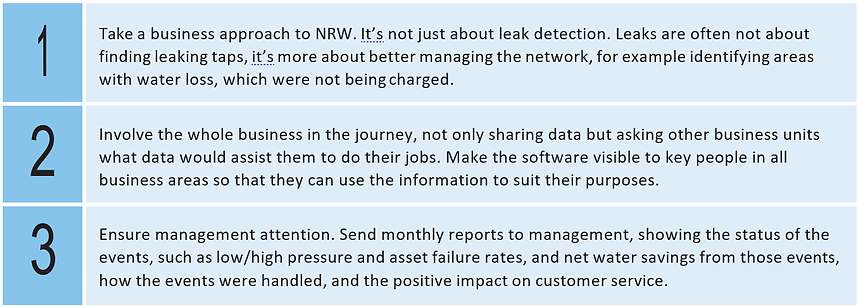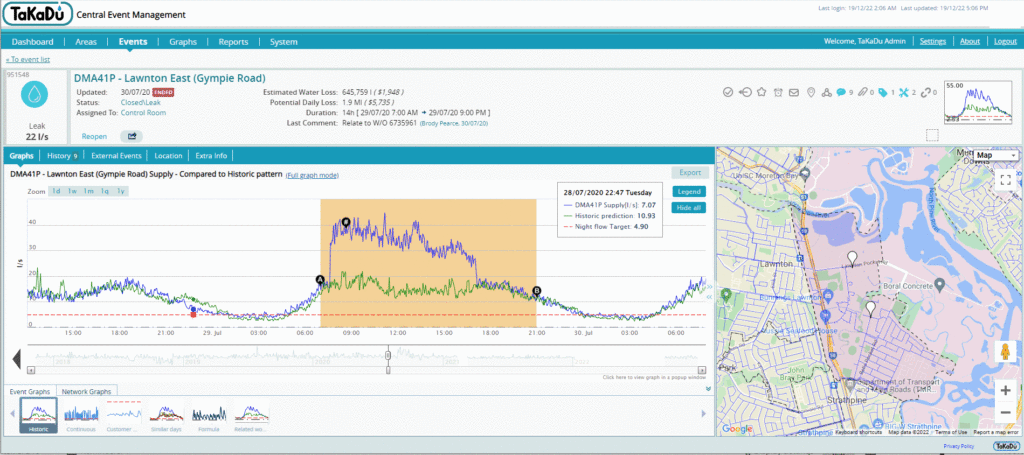
Unitywater’s Journey to become a Smart Water Network
Unitywater and TaKaDu have been working together since June 2013 when Unitywater commenced a long-term engagement with TaKaDu to improve network visibility and efficiency, reducing costs and water losses, and improving customer service. Since then, Unitywater has become recognised as an industry leader in innovation and technology. This paper discusses the PPT (People, Processes and Technology) strategy involved in the TaKaDu implementation and the resulting benefits to Unitywater’s network performance and operations.
Business Need
In 2013, Unitywater was recording significant non-revenue water (NRW) loss. The manual process of identifying leaks using acoustic sounding systems was proving slow and inefficient. The compounding issues were that the areas covered were too large, there were not enough district metered areas (DMAs) and there were too few meters monitoring the system. Faulty asset repairs were also taking too long and it was hard for maintenance teams to locate hidden leaks.
Unitywater identified a business need for a comprehensive technological solution and consequently evaluated TaKaDu’s Integrated Event Management system, an IoT cloud-based software solution using big data analytics.
With aims to improve overall network visibility and efficiency, reduce water loss and save energy costs, Unitywater established a dedicated team to manage a 12-month trial. Following this successful trial, Unitywater deployed TaKaDu throughout its network in July 2014.
People
A new team was established to act as a central dispatch desk for all network events detected by the TaKaDu system. Adrian Bird was appointed by Unitywater as a System Loss Engineer to oversee the new team. This team, which would work alongside existing field crews, received training from TaKaDu and its local partner, Jacobs.
Towards the end of the trial, a cross-departmental NRW Working Group was formed comprising of personnel from a diverse range of business units within the organisation, from retail and asset management through to planning and maintenance crews. Working group members quickly recognised that TaKaDu’s event management offered more than simply leak detection. TaKaDu provided a focal point to collect data not only on the performance of the network but also on other areas of the business.
The working group, which continues to meet monthly, began to look at proactive ways to reduce asset failure rates and identify areas with high unmetered consumption i.e. areas with fairly high NRW which hadn’t been billed.
Adrian Bird explained, “TaKaDu gave the business a high level of visibility and focus, not just looking for leaks but also for other types of asset failures (telemetry, meters, etc.). We used the macro information we were gaining to understand the types of assets which were causing the leaks, the water pressure we were providing in certain areas, and the overall impact on the operation. We could understand what is important and not just what is urgent, across all types of problems.”
As part of the implementation, Unitywater also recruited additional field staff to respond faster to network events detected by TaKaDu and handled by their central team.
Processes
The initial task was to establish 25 DMAs, with a target of increasing the number to 40 within a month. The System Loss team ensured that the TaKaDu event management system obtained data from the appropriate data points inside the network, such as flow meters and pressure gauges. It should be noted that following the trial, the System Loss team created an additional 90 DMAs within 12 months. There was a clear value in measuring more areas.
During the trial, weekly meetings between Unitywater and Jacobs were held to discuss project status, issues, deliverables and reports to management. These meetings were also used to explore proactively how the information generated by TaKaDu and being processed by the central team could be used by the repair teams in a timely manner. Later in the process, the team also explored how it could improve processes and impact positively on other areas in the organisation, such as asset management.
With a larger team dedicated to TaKaDu, Unitywater was able to investigate and deal more quickly with network events. The team evaluated equipment, assets and future planning relating to water flows, pressure and break events. For example, appropriate water pressure levels in specific areas were identified thereby reducing certain types of leaks and breaks.
In addition, the system planners were able to better develop new areas and implement solutions in existing areas to reduce asset failure frequency.
Unitywater started to monitor and analyse TaKaDu on a daily basis. The process, which continues today, included:
5-days a week monitoring of the events detected by the software
An initial analysis undertaken of every event:
Receiving the initial event and reviewing against work orders and known events
Monitoring the event for a short period to confirm an actual event occurred, not a short-term usage event
Categorising actionable events, providing suggested actions, and transmitting advice to management for consideration
Updating system events with actions taken
Monitoring changes in the event and providing updates, as required
Closing events that were no longer active
Providing monthly reporting to management on:
Outcomes of actioned events
Savings in non-revenue water
Asset failures
Providing detailed quarterly reporting on:
System findings – data availability, number of events and type, water balance reported by DMA and by region. These were tailored to report any other items noted by the system that were not leakage related but showed system anomalies;
Resolutions – summary paragraph, supported by charts and graphs that demonstrated actions and benefits of the implementation. Tailored for management requirements.
This process remains central to the day-to-day operations and the way Unitywater handles incidents in its network, leveraging the ‘real time’ visibility provided by TaKaDu and its event management features.
Technology
Data:
There was a need to collect raw data in real-time and in a higher resolution. Two main systems were used to transfer data to TaKaDu: cloud-based data logging systems and graphical information systems (GIS) in order to map the DMAs and infrastructure locations. The data logging system recorded the average flow/pressure every minute and transferred the data to TaKaDu on an hourly basis.
Other sources of raw data included water quality sensors, reservoir levels, and PRVs (pressure reducing valves).
We believe that, over the next few years, the amount of raw data will dramatically increase as the price of sensors goes down as well as the communication layers. There will be more data, from more measuring points, in a higher measuring frequency.



Analytics:
TaKaDu’s solution offered in-depth visibility and quick insights into types of events, such as pressure/flow trends, faulty assets, hidden leakage, supply interruptions, repair verification, water quality issues and early warning of anomalies. Events were automatically supplemented with the start time, type, magnitude, water loss, during and end-time. Each event was prioritised and assigned an event owner.
The Areas View allowed the team to visualise and compare network performance on an area basis, so that events could be prioritised per area against specific indicators, such as nightline, technical efficiency etc. They could also be customized with specific area characteristics.
Based on automated statistical algorithms, TaKaDu’s software generated flexible reports, based on event handling by status, locations, type etc., as well as anomaly and patterns detection, historic and network-based predictions, and more.
The Management Dashboard enabled the team to zoom in and out of areas of interest and the managers to track and report the network’s performance easily.
Results
1 2-month trial:
On November 1 2013, all 40 DMAs were operational, one week earlier than planned. As an example of TaKaDu’s immediate impact, the first alert received led to the discovery of a pipe on a property that had potentially been leaking for more than two years. The economic and the engineering benefits of the TaKaDu trial were instantly realised. As an added advantage, the longer the data was in the TaKaDu system, the more accurate the alerts.
Towards the end of the trial, Unitywater’s System Loss team conducted a cost benefit analysis, working closely with asset management colleagues. This analysis enabled Unitywater’s asset managers to examine the relationship between asset failures and NRW loss, based on the types and age of assets.
Recording and analysing TaKaDu events also helped to build a more intelligent business system. The cost savings delivered by the TaKaDu system prompted a decision to fully implement the system across the entire network over the next two years.
Full implementation:
Following full TaKaDu implementation, there was an immediate, high volume, reduction in NRW loss. The more areas that were monitored, the greater the results. Unitywater was able to reduce its reactive maintenance, break and leak events, NRW loss and asset failure while also gaining improvements in pressure management.
Collaboration across departments through the NRW Working Group has impacted the whole organisation in previously unexpected ways. Billing data can now be compared with NRW ensuring that properties are correctly metered and billing is accurate.
Importantly, TaKaDu has helped to improve customer service. Contact centre staff can respond to customer enquiries and issues about water supply and water pressure with greater ease and accuracy. TaKaDu has also helped to reduce reactive maintenance call outs and enabled a faster crew response time to issues. In addition, TaKaDu has positively affected capital expenditure programmes, allowing Unitywater to achieve a better return on investment and defer unnecessary expenditure.
TaKaDu now covers around 90% of Unitywater’s network. With its multi-dimensional impact, TaKaDu serves as an efficient management and information system for gathering and disseminating data, improving business processes and procedures and reducing operational costs.
Adrian Bird, continued “With the knowledge generated by TaKaDu, we can better understand our network operations, planning and service levels. We’ve also worked with TaKaDu to introduce new features in the system to give us the results we required, for example, an automated water balance software. It originally took five working days to work out the amount of water going in vs the water being billed, we can now see it at a touch of a button.”
“TaKaDu’s system has helped us achieve $16 million in savings from hidden (underground) leaks and prevented 6.5 billion litres of water loss based on an annualised calculation,” Adrian said.
“There has also been a 60% improvement in reactive response times to leak, break and pressure faults in the water supply network. The system has learned how our network operates and has helped us avoid major water outages, identify the cause of dirty water complaints, identify pump faults that cause bursts before they happen and track the status of events from start to finish.”
Next Steps
By combining the PPT – People, Processes, Technology – strategy, Unitywater was able to successfully optimise its network efficiency, reduce its costs and improve its customer service.
Unitywater and TaKaDu are now collaborating to offer TaKaDu’s IoT cloud-based solution to other water utilities across Queensland. This offer provides network monitoring, leak detection and network prediction services to small water utilities (those with less than 2000 km of pipeline). These smaller utilities are able to leverage the benefits of Unitywater’s size and familiarity with TaKaDu by adding their service area to Unitywater’s TaKaDu system. The offer also promotes collaboration across Queensland water utilities, a key objective of the Queensland Water Directorate.
Key tips for success

Unitywater (www.unitywater.com) provides essential water supply and sewage treatment services to residents and businesses in the Moreton Bay, Sunshine Coast and Noosa regions of South-East Queensland, Australia. Every day Unitywater operates and maintains more than $3.1 billion of essential infrastructure, delivers drinking water treated to ISO 22000 international food safety standards and treats 58 Olympic-sized swimming pools worth of sewage for more than 16% of Queensland’s population, spread across 5223 square km.

